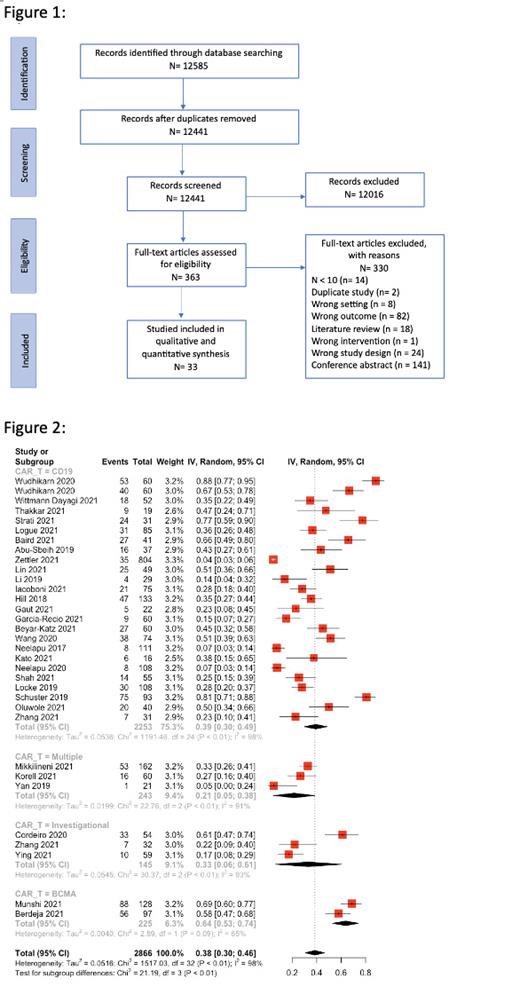Background:
Chimeric antigen receptor (CAR) T-cell therapy is a rapidly evolving immunotherapy for hematological malignancies. With increasing access to this modality, there is an urgent need for a comprehensive understanding of infectious complications to optimize prophylaxis and improve clinical outcomes. We conducted a systematic review and meta-analysis to assess the incidence and characteristics of infectious complications in adult patients receiving CAR T-cell therapy.
Methods:
The study was registered on PROSPERO and we searched 5 electronic databases from inception to 2022. Each author independently screened titles, reviewed full texts to identify eligible studies and extracted data from included studies using Covidence, a data extraction tool for conduction of standard systematic reviews. A random effects model was used, and proportions were used as a measure of outcome. We assessed heterogeneity using I^2 statistic. Risk of bias assessments were conducted using the RoB 2.0 for RCTs and ROBINS I tool for non-RCTs.
Results:
Our search identified 12,441 studies of which 363 underwent full-text review (Figure 1). 33 studies were eligible for inclusion in the analysis and enrolled a total of 2866 patients. The pooled incidence of an infectious event in adult patients after CAR T-cell therapy was 38% (95%CI 0.31, 0.46; p<0.01; I2 = 98%]. No significant difference was noted in the incidence among studies with a longer follow up duration compared to studies with follow up of £ 30 days [40% (95% CI 0.30-0.50) vs 32% (95% CI 0.24-0.40), p=0.20 respectively]. BCMA-directed CAR T-cell therapies used for management of multiple myeloma had a significantly higher incidence of infectious complications compared to CD19 targeted agents, 64% (95% CI 0.53-0.74, I2 = 65%) versus 39% (95% CI 0.30-0.49; I2 = 98%; p <0.01) respectively, Figure 2. Clostridium difficile and Escherichia coli were the most common pathogens causing bacterial infections, while cytomegalovirus was the most commonly identified viral pathogen affecting these patients.
Conclusion:
In this study, BCMA-directed CAR T-cell therapies were associated with a significantly higher risk of infectious complications. The results of this study can guide the development of strategies to prevent and manage infectious complications in this patient population.
Disclosures
Arnason:Bristol Myers Squibb: Speakers Bureau.


